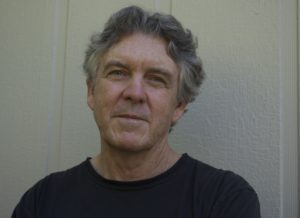In Recall
He’d loved Jung’s Memories, Dreams, Reflections as a young
man, and if you asked him about it now he’d probably call it
enthrallment, for what returns to him are not Jung’s concepts
or any particular idea, but a sense that he was being freed—
certainly from the Catholic dogma he’d been yoked to for
twenty years, but also sent simultaneously by Jung into a
synchronicity with the woman he was falling in love with. She
was discovering the collective unconscious, too, and they were
unconscious together—hyper-aware of symbolism, uncovering
ancient myth & metaphysics for the first time—all of this
made more real as they discovered the transformative power of
their bodies.
Could Jung have rung so deep a chord without the
resonating vessels of their bodies? Could their bodies have felt
that holiness—archetypal—without their having studied him?
Did they invent those thoughts—that heat—simply because
they were young?
In fact, they never spoke of it until this year, half a century
later, when, still lovers, she said, “Do you remember when we
were first dating and we were reading Jung?”
And then he:
“I remember the beauty of your shoulders.”
In Cactus
The “leader,” his thin shirt sliced by spears of yucca, six of you
behind him, he with his machete, the yucca bleeding as he hacks
his way through/carves a flashlit path, clear yucca-blood staining
your shirts as you follow. You’re grateful for his guidance-he in
his shredded straw hat—but there’s a condescension in him that
you find disturbing.
This is not the kind of guide you had in mind. You’d hoped
for explanatory—archaeological, historical, maybe sometimes
funny—but instead, all this midsummer evening it’s been silence
& cactus: and now he slices his way into a clearing and says Here
is where we will camp for the night. You still have water, do you not?
I should have told this to you.
You should have known to bring more water. You’d first
met the hotel lobby, the group of you, cocktails in hand, he’d
walked in promising adventure, an ad-hoc overnight in which
if things went very good you’d see the constellations so big they are
out there, he’d take care of all ‘rangements (he meant arrangements,
you’re sure, but you never asked him to define them), and now
here you are, cold setting in (“A desert gets cold at night,” you
hear the elder local woman in your group say—she, who you
think never should have come this far), the clearing inside the
ring of cactus just adequate for the seven of you to lie down
on the plastic drop-cloths he’s spread on the rubbled soil, rocks
piercing the plastic, and now he distributes airline blankets, One
each now, he says. That is all in my believing you will need.
And he’s not staying! He’s not staying! I must now leave you
for time. have business of family…. Now suddenly shifts to
his native language, the old woman translating If am not
back morning, will bring food when I do come. Then back to
English: Now: there anyone who has not water and a few of
you nod, and shrugs his shoulders, says Share, then, I am sure,
and is gone.
You settle under your airline blanket, sharp rocks finding
your back, remember the last line of the novel you’d just that
morning finished: “Two of were left then, still certain he
would come….”
In Silence
The strength of her silences sometimes frightened him. Most
of his were temporary, had questions implicit in them, and if a
companion were perceptive, he or she would allow that silence
its time, then ask the buried questions.
Sometimes his own questions to her were a challenge—
what he would have hoped to have been asked—Is that what
you really mean, or is it more than that? or sometimes they
were just fillers against the void-What do you have in mind for
dinner?
So in a sense, there never really was silence with him:
only incipience, a mute hesitance more pause than silence, a
window-shade drawn on a tightly-wound spring.
Hers, though, held a solidity, a sense that there’d been
no time before or after, and though Zen masters might have
deemed it “centered,” it was not that—its time was neither
circular nor linear: time itself puddled in front of it, useless
measure ticking its hours.
Was it productive? Was it calming? Did it serve to deepen,
was it idle, hostile?
None of these things. It was as if she were a diamond setter
by day and by night she worked to tweeze the diamonds out.
And it was the draw-string velvet bag of her diamonds, he
knew, that he kept in his pocket, fuel cells for his movements,
for his nerves, for his own silence, rarely inquired-about by her,
and thus rarely answered.

Gerald Fleming’s newest book is One (Hanging Loose Press, New York, 2016), prose poems in monosyllabics. Previous books are The Choreographer (prose poems, Sixteen Rivers Press, California, 2013), Night of Pure Breathing (prose poems, Hanging Loose, 2011), and Swimmer Climbing onto Shore, poetry (Sixteen Rivers, 2005). He taught in San Francisco’s public schools for thirty-seven years and has written three books for teachers, including Rain, Steam, and Speed (Jossey-Bass/Wiley). From 1995 to 2000, he edited and published the literary magazine Barnabe Mountain Review, and is currently editing both the limited-edition vitreous magazine One (More) Glass and The Collected Prose & Poetry of Lawrence Fixel. He lives most of the year in Lagunitas, California, and part of the year in Paris.





















































